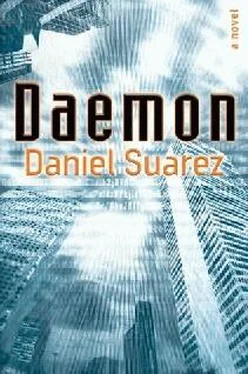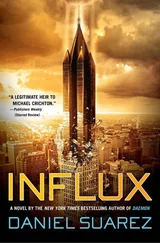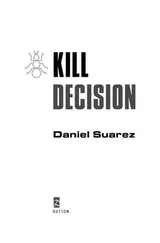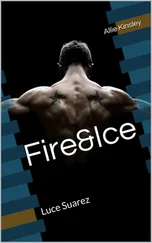He shielded his eyes against the sun and tracked the progress of an unmarked Bell Jet Ranger helicopter coming in low over the distant hangars. It headed toward him—and toward Building Twenty-Nine.
Building Twenty-Nine sat on the far end of a runway apron, on a strip of landfill jutting out into the bay. There wasn’t anything around it for a quarter mile in every direction—just flat concrete, marshland, and open water. The building itself was windowless, long, and narrow. A blockhouse of high-density concrete. It looked like it was built to survive a direct hit by a five-hundred-pound bomb—which it was.
The helicopter descended, lifting up its nose as it crossed a razor-wire fence backed by concrete highway dividers blocking the entrance to the peninsula. Rent-a-cop security guards patrolled the perimeter, which was liberally marked with biohazard signs reading Danger: Radon Contamination.
The chopper continued for a few hundred yards, then set down on a weed-tufted stretch of concrete within a hundred feet of Ross.
Agent Roy Merritt stepped out. He wore an off-the-rack suit, bad tie flapping in the wind. His burn scars were still apparent on his face and neck, even at this distance. He nodded to the pilot as he pulled two cases from the rear seats—one a small ice chest marked with a red medical cross, the other a featureless black, hard-sided case. Merritt walked briskly to the edge of the chopper wash and let a grin crease his usually stern face as he saw Ross. The chopper rose into the air behind him and banked away over the bay, leaving them in comparative silence.
Merritt nodded to Ross. “What’s with the escort?”
“You tell me.” Ross turned to regard the four heavily armed men standing next to him. They wore combat uniforms printed with a new camouflage pattern, one designed to blend in with the background of society: black Kevlar helmets and matching body armor stamped with the friendly, white corporate logo of Korr Security International. Automatic weapons were slung over their shoulders. They stood silently by, as though they didn’t exist.
“Let’s just say I’m closely monitored.” Ross turned back to Merritt and smiled. “It’s good to see you, Roy.” He offered to take the hard-sided black case.
“Thanks.” Merritt passed it to him, and then they shook hands. “I heard that you cut a deal with Washington. They treating you well?”
“We’ve had some procedural disagreements. Apparently amnesty is a synonym for ‘prisoner’ in the government dictionary.”
Merritt frowned. “I know people in Washington. I’ll see what I can do.”
Ross passed the black case to one of the armed guards. “Rush this to Dr. Philips in the lab.”
“Yes, sir.” Another guard grabbed the medical chest from Merritt, who reluctantly released it. Then the two guards rushed off toward the heavy steel doors of Building Twenty-Nine.
Ross and Merritt followed behind at a walking pace, trailed by the remaining two guards.
Ross turned to Merritt. “You in town for a while?”
“Just the day. I was hoping to get back home. It’s been a week or so, and Katy’s team is in the regional quarter-finals tomorrow.”
“ Grammar school?”
Merritt laughed and nodded. “Yeah—we take our sports seriously in the Midwest.” He got somber. “Truth is, I just miss the hell out of them. Comes with the job, I guess.”
“How’d it go in São Paulo?”
“Thankfully, the fireworks were over by the time I got there. That guy took out twenty-seven local and federal police before they punched his ticket. The ABIN wasn’t eager to part with the evidence.”
“Building a case is the least of their worries.”
“A lot of diplomatic strings were pulled while I was down there. What’s up?”
“You’ll see in a few minutes.”
As they entered the cavernous doorway, their rear guard hauled steel doors closed behind them with a deafening clang . They were now in an austere, brightly lit concrete anteroom, opening to a hallway lined with bare bulbs and electrical conduits.
Merritt looked around as a guard waved a metal detection wand over him. “What is this place?”
“Daemon Task Force headquarters.”
“You put a top-secret base in the middle of a city?”
“Remote locations don’t mean secrecy anymore. Companies are selling time on private spy satellites. Here we hide in plain sight.”
Merritt nodded and glanced around while the wand beeped and whined. Merritt voluntarily revealed a pistol in a holster beneath his jacket. “I’m FBI.” He produced credentials, which the guards closely examined. They keyed Merritt’s name into a computer to confirm his clearance. They then pressed his thumb against a fingerprint-capture pad, waited for a single beep, then turned to him again.
“Are you carrying any other weapons or electronic devices, Agent Merritt?”
“A knife.”
Another guard passed a tablet PC to him and offered a stylus. “Can you please sign this nondisclosure agreement?”
“I’m already cleared top secret—code word Exorcist .”
“This is an intellectual property agreement, sir. You need to sign to enter.”
Merritt sighed and turned to Ross questioningly.
Ross just shrugged. “Welcome to the Task Force.”
“Christ…” Merritt signed with the stylus.
While he did so, another guard hung a plastic badge around Merritt’s neck. Ross motioned for him to follow down the corridor.
As they walked, Merritt twisted the badge around to examine it. The card was slathered with inscrutable patterns and shiny printed circuits. “You’d think they could afford photo ID badges.”
“It’s not an ID badge. It’s a biometric training marker.” Ross pointed to the ceiling.
Merritt saw a series of small cameras mounted there, running down the length of hallway.
“Your gait is being memorized, Roy. The security system is learning to recognize you from your walk and facial features.”
Merritt eyed the cameras suspiciously.
They soon reached the end of the corridor, where doors of clear ballistic glass blocked the way. Armed sentries stood on both the near and far side—weapons at the ready. One of the guards there removed the training marker from around Merritt’s neck.
“Thank you, Agent Merritt. You are Sec Level Two. Please observe the posted warnings. This is a lethal force zone.”
“Thanks.”
The doors slid open to admit them, and suddenly raucous conversation and clicking keyboards spilled out into the hall.
Ross brought Merritt into a high-ceilinged room about sixty feet square. In a past life it was probably a heavy-equipment room—overhead pulley rails were still in place. Now it was filled with modern, open workspaces, with clusters of five or six computer workstations sharing common desks. The room was crammed with guys in their early to mid-twenties—all wearing headsets and shouting to each other as they played 3-D computer games. Brilliant computer-generated vistas filled twenty-inch flat-panel monitors. It was like a raucous LAN party.
Merritt stared in amazement. “What’s all this?”
“Gaming pit. We’ve got top young minds here from the public and private intelligence sector playing The Gate, Over the Rhine, and half a dozen other online games.”
Merritt surveyed the room. “It’s a bunch of college kids. They’re looking for the Daemon?”
Ross nodded. “Come here.” He brought Merritt up to a broad table covered in piles of large color maps. A nearby large-format color printer was spitting out a new one. “These are level maps we found on the Net. This one’s a custom level for Over the Rhine. That one over there is a castle blueprint from The Gate. Daemon Factions create these as bases of operations and training. The most interesting ones are encrypted—although Natalie’s crypto people can get us in pretty quickly. We’ve found some maps that match the floor plans of real-world structures and huge ones that model real-world city streets. Our teams discover a map and reconnoiter it—by force, if necessary. We try to determine the map’s purpose, and lastly we try to infiltrate Faction ranks.”
Читать дальше












